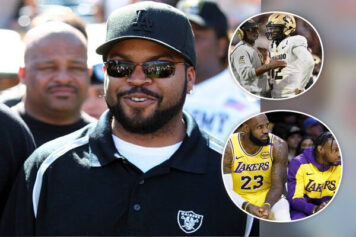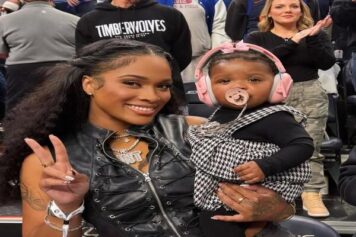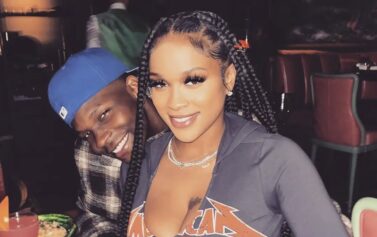Ice Cube’s BIG3 professional basketball league tips off today, Sunday June 25th, at Barclays Center in Brooklyn.
The BIG3 is a touring league that packs the energy of All-Star Weekend into a one day event. It promises to bring excitement to each arena and market that it hits this summer while featuring great former NBA players who made a tremendous cultural impact during their playing days such as Allen Iverson, Mahmoud Abdul-Rauf, Jason Williams and others.
ICE CUBE: BIG3 Official Music Video
Coming to FOX Sports FS1 The BIG3 is where the best to ever do it, keep doing it. We’re changing the game. Ice Cube and The Answer: The Making of the BIG3 premieres Thursday, June 22 at 7 PM ET/4 PM PT. www.big3.com
After debuting in New York this weekend, the league will make stops on consecutive weekends in Charlotte, Tulsa, Philly, Chicago, Dallas, Lexington and Los Angeles. The playoffs will be on August 20th in Seattle, with the championship scheduled for Las Vegas on August 26th.
The Shadow League recently sat down with the BIG3’s #1 overall draft pick Rashad McCants, the four-year NBA vet who won a national championship in 2005 with the North Carolina Tar Heels and also played professionally in Brazil, Lebanon, Venezuela, China and the Dominican Republic, to talk about the the new league, his journey through basketball, NBA career and his controversial stance against the NCAA, among other topics.
Player Profile Rashad McCants
Rashad McCants ain’t messing around. See who else has been putting in the work when #BIG3 hoops premieres next Monday, June 26, 8 PM ET, on FS1
The Shadow League: What is it that excites you about this BIG3 league and the opportunity that it presents?
Rashad McCants: Just the opportunity to be around such elite company, the legends of the game, the Allen Iverson’s, the Julius Erving’s, the George Gervin’s, the Gary Payton’s. It’s humbling, I couldn’t ask for anything more.
TSL: What have you been doing in the gym to get ready?
RM: My game is predicated on isolation one-on-one situations, so the 3-on-3 game fits right into my regimen. Adding the repetitions of shooting the 4-point shot, which is a 35-footer, that makes training pretty fun. Gearing up for this has been very exciting.
TSL: Let’s rewind it and take it back to your early days growing up in Asheville, North Carolina. When did you realize that you had the b-ball skills to compete against the best of the best?
RM: I was about 15 years old, a sophomore in high school. I was playing AAU, went to the Nike camp and was playing USA Basketball. That’s where I was going up against the top talent from around the country. That’s where my talent began to flourish and showed me that I was in that elite company.
From there, I had the opportunity to attend a prep school, the New Hampton School in New Hampshire. I spent two years up there, which allowed me to work on being both a student and an athlete. I was named the Student of the Year two years in a row along with being named the Athlete of the Year both years as as well.
undefined
undefined
TSL: What was behind your decision to leave your high school in North Carolina to go to prep school in New Hampshire?
RM: My AAU teammate Wes Miller, who I later also played with at the University of North Carolina, told me that it was a great opportunity to expand as an individual, both in the classroom and on the court, living on a campus, and the environment would allow me to really focus on academics. It sounded like something I needed because of what I wanted, and that was to chase the dream of what Michael Jordan did in college.
TSL: So becoming a Tar Heel was always a dream of yours because of Jordan?
RM: Yes, I wanted to chase his shadow and mimic his greatness and accomplish what he achieved on the college level.
TSL: Your freshman year at UNC, you came blazing out of the gate. Some guys have a difficult time adjusting to college ball, even some players that were McDonald’s All-Americans like you. What allowed you to succeed so early?
RM: Going to prep school gave me an advantage. It was almost like college, so my preparation and mentality were advanced. From the moment I stepped into college, I knew exactly what I was going to do and how I was going to do it. I knew how I could impact the game.
I was playing against fifth-year seniors in practice, and that helped me understand the tempo and competitiveness that was required to excel in the ACC and in college ball in general. My first game, scoring 28 points out the gate, was no surprise to me.
TSL: You walked into a situation where North Carolina was down. The glory days were on pause. As a freshman, you played in the NIT before getting the program back to the NCAA Tournament as a sophomore. Take us behind the scenes on that.
RM: My freshman and sophomore years on the court might have looked and seemed exciting, but there are a lot of roadblocks as a student-athlete that you have to overcome. Once you step on the hardwood, that’s where the fun times happen. The losing early on was tough, along with not getting the team to where we wanted to go those first two years because we wanted to return UNC to a place of prominence again.
undefined
undefined
TSL: By your junior season, you guys were a powerhouse that finished 33-4 and won the national championship. I loved watching that team play. What pops in your head when you reflect back on that?
RM: The first thing that comes to ind when I think about that year was my mother being diagnosed with breast cancer. I had to overcome some really strong emotions and that was a difficult time. Also, I was projected as a top-15 pick coming out of my sophomore year, but I wanted to come back to chase that national championship. My mom’s diagnosis made that a bittersweet situation for me.
TSL: You accomplished a goal that not many achieve, taking the whole thing in March Madness. You guys walked into a challenging situation and helped the UNC program get its sexy back. What comes to mind when you think about cutting down the nets?
RM: North Carolina was coming off of an 8-20 season when we got there. I came there to chase MJ’s legacy and to help get the program back to that elite level that it needed to be at. To accomplish what we set out to do and win the National Championship was incredible. But after winning the title, it was time to move on to the next challenge.
We started the year ranked No.1 and finished the year ranked No.1, and I was projected to go early in the first round of the NBA Draft. So it was time to bounce.
UNC 2005 One Shining Moment
UNC 2005 National Champions One Shining Moment
TSL: Talent-wise, you were projected to be a top-5 pick, but you fell to the back of the lottery. Take me through the draft process, getting selected by the Minnesota Timberwolves and trying to establish yourself there.
RM: That whole draft process was exhausting. I accomplished a lot in college and dominated at times, so it was tough seeing guys get picked ahead of me like that. Eventually, I was selected with the 14th pick. My emotions were up and down because I didn’t know where I was going to go. But going to Minnesota was exciting because I had the opportunity to play with Kevin garnett, who was one of my favorite players in the league.
TSL: By your third season in the league, you were more than just a solid rotation player and it looked like you were on the cusp. But that’s not how things played out.
RM: My rookie year, Dwayne Casey was our coach and he didn’t believe in playing rookies a lot in the second half. But I had some very productive second quarters. I averaged close to ten points per game playing mostly just in the second quarter. That allowed me to set myself up as a young backup who could be a Vinnie Johnson type of reserve player as a guy who could come off the bench and provide instant offense.
My second year, I had micro-fracture surgery which held me out for nine months. In coming back that second season, Casey was fired and Randy Wittman was brought in. Going into my third year, my knee felt 100% and I started the year with confidence and flourished, averaging about 15 points in less than 30 minutes per game.
The mentorship from KG, before he went off to Boston, was so essential in terms of keeping my composure and learning what real leadership is all about. I was so excited about the next steps forward, especially in my contract year, where I was capable of averaging more than 20 points per game and showing my talent to the world.
McCants Career HIGH!
Career HIGH!
TSL: At the age of 23, you were one of the top young talents in the league and it seemed like only a matter of time before stardom beckoned. How did things end so abruptly?
RM: I consider the time I spent in the league a success. When it comes time to filter out what happened, looking back at guys like Mahmoud Abdul-Rauf and Craig Hodges, there are certain things that happen in the league that we don’t have control over. It’s unfortunate that some players get there opportunities taken away. But when you stand for something bigger, it becomes a conflict of interest at that point.
TSL: You took a very controversial stand that still has many in the UNC family looking at you sideways. You spoke your truth, from your own unique perspective, about your experience there and some academic improprieties. Where you prepared for the backlash?
RM: Yes, because at the time of all the hoopla I was going through my own awakening in terms of developing sports education programs to help athletes really get educated for the future. I was focused on financial management, financial literacy, financial education and understanding. I took my opportunity to expose the NCAA’s model of free education and no compensation as fraudulent.
North Carolina was not giving me a real education. I was on the Dean’s List and not having to go to class, being directed towards courses where I’d get easy grades while doing little work. I’m sorry, but that’s a red flag. I gave an example of the fraudulent education that some college athletes receive, something that had been going on at North Carolina for 20 years.
This isn’t just any university, it’s one of the best in America. So if the top schools are doing these type of things, we have to know that it’s happening at many other places and the problem is widespread.
Rashad McCants: UNC Academic Fraud Scandal
Former UNC basketball star Rashad McCants details the academic fraud that he says he and some of his teammates participated in while playing for the Tar Heels’ 2005 national championship team.
TSL: And then there’s the whole financial side of that equation.
RM: Without a doubt. The coaches are getting millions. The strength coaches are getting paid, the parking attendants are getting paid and we’re the ones that people are paying to see, and we’re not getting paid.
TSL: That ESPN interview and your take on the hypocrisy of the NCAA unleashed a torrent of anger in your direction, while a minority applauded you for speaking out. Tar Heel fans want your jersey, which hangs in the rafters of the Dean Dome, taken down. Looking back on that interview, what do you think about it now?
RM: My ESPN interview was produced in a certain way. My regret is that I did not know ahead of time that it would be edited in the way that it was. My argument was about the hypocrisy of the NCAA and how the financial model is flawed. They made it seem like I was on a mission to just bash the University of North Carolina.
ESPN has to broadcast the college games, right? The NCAA is one of their biggest clients. The interview I gave them was about the all-around hypocrisy that elite college athletes face, especially when it comes to the amount of money that pours in. And it was edited down to make it seem like it was me against North Carolina. I was simply giving my experience to make a larger point.
TSL: Moving forward, how can you help today’s elite college athletes who are in the shoes that you were once in?
RM: It’s difficult to ask other people to stick their neck out. Folks are focused on what they have, what they’ve built and they’re not trying to lose that. I understand that.
For me, I owe it to my family, my kids, your kids, everyone, to make sure that they’re not out here making money for all of these other companies, entities and corporate interests without getting anything in return.
For some of us, once our eligibility is up and we can’t make any more money for the university and the NCAA, they don’t have any more use for us. We go back to the hood. Instead of that being the option for some guys, I want to create opportunities and platforms so that when we leave college, we have better options.
Playing sports at the elite level in the NCAA is basically an internship and if they’re really about providing a real education, we have to do away with players being funneled into this easy courses for the lone purpose of keeping them eligible. They’re not trying to set us up for the future, they’re setting us up to make money for the university in the present, and that has to change.
undefined
undefined
TSL: The media, and social media as well, has been flooded with stories about you recently, whether it was the Khloe Kardashian situation or others that make you out to be some sort of head case. That has to be frustrating to you.
RM: People can’t see what I’m really fighting for because of the soundbites that dominate the perspective. It can get a little bit irritating but the truth is everlasting and that will endure. Once people get the real story, their perspective will change. And there is an apology that will be in order.
I never compared myself, like people try to make it seem, to a civil rights icon like Malcolm X and Martin Luther King. I simply said that they inspired me to take a stand for what I believe is right. I’m going to shed light on what I feel is wrong in this industry, so now let’s try and change it.
TSL: After this BIG3 experience, what’s next for you? What are you looking to do moving forward?
RM: The BIG3 has given me another opportunity to have a voice, and I’m greatly appreciative of that. I’ve got a few things up my sleeve that I’m working on.
I’m looking to get more involved in philanthropy, to help younger athletes become better people that are more aware of what’s really going on out here. I’m grateful that Ice Cube created this opportunity, for being picked to participate and allowing me to resurface. It has given me an opportunity to reinvent myself and allows people to see me for who I am.



